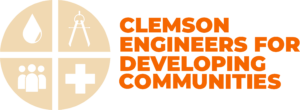What is CEDC?
- CEDC is an award-winning student-led internship program that works with local communities here and abroad to solve real-world problems.
What is CEDC’s mission?
- At Clemson Engineers for Developing Communities’, our mission is to work with communities to develop sustainable solutions that improve the quality of life through interdisciplinary student-led initiatives that embody our core values in partnership with organizations whose mission and values align with ours.
What are the core values of CEDC?
Accountability:
- We recognize and accept responsibility for our actions and their outcomes while honoring obligations, expectations, and standards of ethical conduct.
Commitment:
- We acknowledge our generation’s responsibility as global leaders to holistically apply interdisciplinary solutions towards social, environmental, and economic issues to enhance future lives.
Service:
- We carry out our moral obligations to improve the safety, health, and well-being of the human race, effectively advancing the standard of living in developing communities.
How and when did CEDC begin?
- CEDC was created by Jeff Plumblee, a Clemson Engineering grad. In 2009 he was given the chance to help with renovations to the water system in Cange, Haiti. The class began with seven Clemson graduate students to provide an outlet of service. Over time the program has adapted to the need for a sustained and diverse student workforce by including freshman through doctoral students across multiple disciplines.
How is CEDC organized?
- CEDC operates under a corporate organizational structure, including vertical integration from first-year to graduate students and horizontal integration from over 30 majors, and works on between 15 and 20 projects per semester.
- A student board of directors with faculty advisors oversees direction and growth of the program. Project managers, assistant project managers, and management directors monitor the progress of the research projects; and functional directors support the needs and objectives of the organization. This offers numerous opportunities for promotion and the opportunity to build real-world organizational skills.
Is CEDC part of the College of Engineering?
- CEDC is a program within Clemson’s College of Engineering, Computing and Applied Sciences and serves the entire University. The program operates out of Riggs Hall.
Who is the faculty advisor for CEDC?
- David Vaughn (dev@clemson.edu), Professor of Practice, is Director of Clemson Engineers for Developing Communities and a Subject Matter Expert to the Department of Homeland Security. He is a former Fluor Fellow, Director of Resilience Solutions, and Secretariat of the World Economic Forum – Disaster Resource Partnership (WEF DRP). He founded and spearheaded development of Fluor’s Business Continuity and Disaster Management Services which helped clients build resilience by mitigating risk to natural disasters. He has volunteered over 15,000 hours with the University and received numerous service awards for his efforts.
How do I join CEDC?
- There are several ways of becoming involved with CEDC. The main point of access for students is meeting a current CEDC member and attending an interest meeting. There students can officially join by registering for the class and choosing their project.
- Interested students can also email David Vaughn (dev@clemson.edu) or email CEDC directly (cedc@clemson.edu) for information on engaging with CEDC.
Do I have to be an engineering major to join CEDC? What do you mean by “engineer”?
- CEDC welcomes students from any major. CEDC has a broad definition of the term “engineer”.
- Engineer(n.): Creative problem-solver trained to think in terms of theoretical frameworks used to solve real-world problems.
Has CEDC received recognition?
CEDC is proud to have received the following awards:
- South Carolina Service Learning Award
- Clemson Service Learning Award
- Distinguished Service Award – Jeff Plumblee (Founder)
- Outstanding Young Alumni Award – Jeff Plumblee
- Martin Luther King Jr. Excellence in Service Award – David Vaughn
- Distinguished Service Award – David Vaughn
- Social Launchpad Award – Peter Butler
- Odebrecht Award Finalist
- Andrew Heiskell Award for Innovation in International Education: Study Abroad (Fending off 1,350 global competitors)
